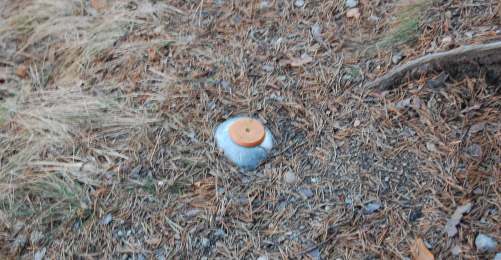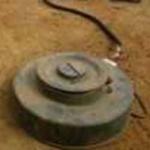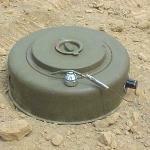Journalist Ali Bulun is the owner of the Nushaber.com website and newspaper, as well as Nusaybin's representative of the Doğan News Agency.
Nusaybin is one district of Mardin, a province bordering Syria. People there have long been affected by anti-personnel land mines, the clearance of which is being hotly debated by politicians at the moment.
Petrol and fertile land
Bulun says, "Geophysically, Nusaybin is a region close to petrol. Just close by is the Kamışlı district in Syria, where petrol has been extracted for 52 years. We are sleeping, unfortunately. Why should foreigners manage this land, which could bring millions of dollars of income annually?"
Bulun is referring to government plans to allow private companies to clear the mine-ridden land in return for its use for more than 40 years.
He argues that the land should be used by people from the district rather than by private companies.
The journalist says, "Everyone knows that Mesopotamia's soil is fertile. This soil has not been cultivated since 1959, when mines were buried there. If Turkey managed this land and gave it to families who have suffered from mines and to farmers willing to farm it, that would be much better."
Employment and border trade
People in the area cultivate wheat, barley, lentils, cotton, chick peas and sweet corn in small quantities, and offering this land to them would go a long way to decreasing unemployment in the district with a population of 88,000.
When a new border gate was opened between Turkey and Syria last year, a Turkish-German partnership, Tüsan-Tauber, won the bid to clear the mines in the relevant border area. Bulun says that all areas should now be cleared.
"Next to the new border gate there will be shops, fields and a lot of transportation. If border trade is opened up, then one can get from Nusaybin to the El Rabiya gate between Syria, and from there to Mosul."
Victims of mines should benefit
Mahsun Özmen, president of Nusaybin's Chamber of Commerce, also opposes handing over the land to outsiders.
"Because the soil is fertile, organic agriculture would work. People from Turkyey used to pass through these areas to visit their relatives in Syria. Most of them were injured or killed (by the mines). The land should be given to their families."
Mehmet Ali Doğru, president of Nusaybin's Chamber of Agriculture, also believes that unemployment could be relieved by cultivating vegetables and fruit on the soil.
Meanwhile, Turkey's newspaper columnists have discussed the question of who should clear the mines. While the government is suggesting private companies, the army has declared that it is unable to clear the mines it has buried for years.
Metin Münir, writer for Milliyet newspaper, said that it was unrealistic to believe that a mine-clearing company would want to cultivate the land. He also pointed out that Turkey had neglected to form a National Mines Agency since the 1990s.
Bila: NAMSA could help
Fikret Bila from the same newspaper, said that NATO's maintenance and supply agency NAMSA had cleared 4.5 million mines without problems in Albania, Moldova, Serbia, the Ukraine, Azerbaijan and Jordan. The General Staff had suggested using NAMSA, but the government seemed to be intent on subcontracting the job, so Bila.
He also called for any solution to take into account the sensitivity of the area, in terms of economic underdevelopment, unemployment and social imbalance.
Army shirking responsibility
Lale Sarıibrahimoğlu of the Taraf newspaper, argued that the politicians were forgetting to ask the most relevant question in the debate: "Not one MP is coming forward and asking why NATO's second-largest army, the Turkish Armed Forces, which still commands a great part of the country's budget, does not have the necessary equipment or personnel to clear mines."
"It is not difficult to develop mine technology, but what is difficult is to clear the mines which they at one time buried at their pleasure."
Kemal Güner, who was the 7th Corps Engineering Commander in Diyarbakır in 1956, when the first mines were buried in the region, told the Zaman newspaper that maps locating the buried mines were in the 7th Corps' archives. The retired commander said that it would be easy to clear the mines with these maps. "The army is capable of this. They should not shirk their duty." (EÖ/AG)














